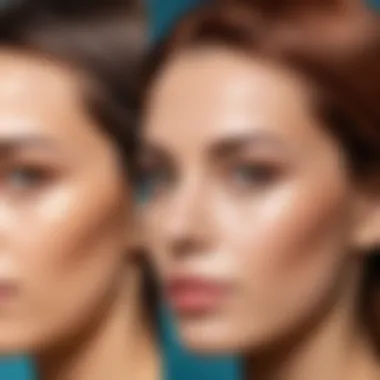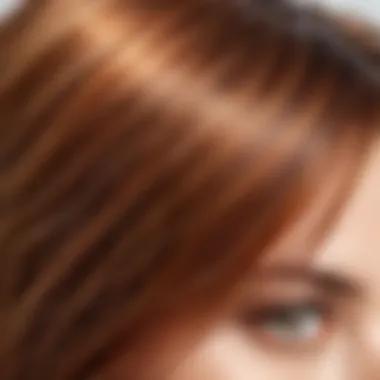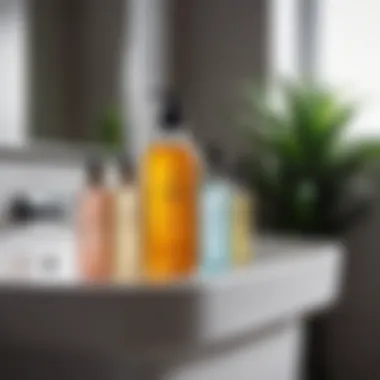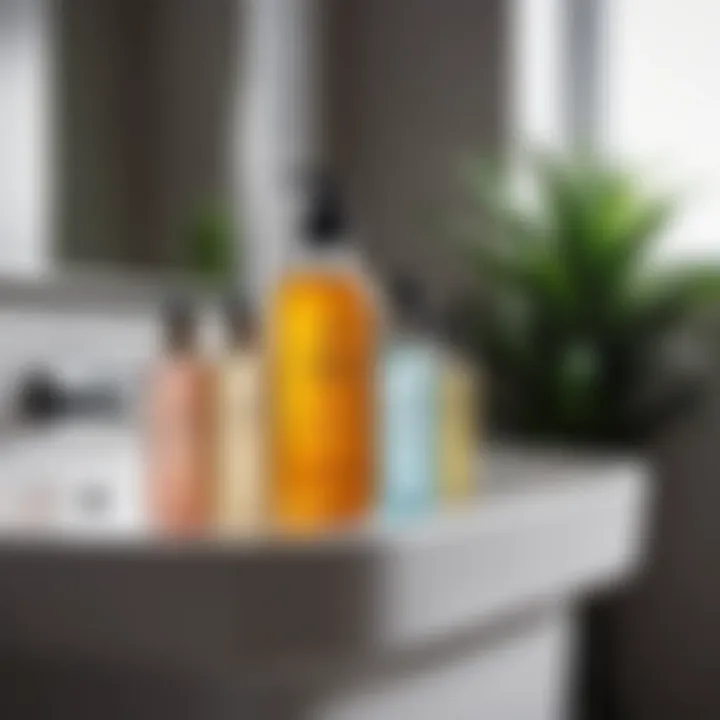Exploring the Advantages of Hair Vinegar Tonic


Intro
In the age of countless beauty products flooding the market, it's easy to overlook age-old remedies that have proven effective time and again. One such remedy that has gained traction in recent years is hair vinegar tonic. Simply put, this is a blend of vinegar—usually apple cider vinegar—and water, sometimes with added essential oils, that brings a host of benefits to your hair care routine.
What makes hair vinegar tonic stand out? It's not just about the ingredients; it's about how they work in synergy to promote healthier hair. Many people have taken to this simple yet profound solution, boasting of shinier, softer locks, and a healthier scalp.
Ürün İncelemesi
Ürün Tanıtımı
Hair vinegar tonic, particularly when crafted with apple cider vinegar, has been used for generations, predating the modern hair care industry. Apple cider vinegar is often hailed as a "jack of all trades" in the beauty realm. Its natural acidity helps balance the pH level of hair, which is crucial for maintaining its structure and integrity. Plus, it can eliminate buildup from hair products and improve overall hair texture.
The tonic often comes in bottles ready for use, yet many enthusiasts prefer to concoct their own mix. This allows for customization, adding specific oils or herbs that suit individual hair needs.
Ürün Özellikleri
- Natural Ingredients: Typically includes apple cider vinegar, essential oils like lavender or tea tree, and water.
- pH Balancing: Repairs the hair’s natural pH, which can be disrupted by harsh shampoos and environmental factors.
- Detoxifying Properties: Removes buildup from styling products, leaving the hair feeling clean and fresh without stripping it of natural oils.
Güzellik İpuçları
Doğal Güzellik Yöntemleri
- Mix Your Own: For those keen on taking the DIY route, combine one part apple cider vinegar with two parts water. Customize it with a few drops of essential oil for a pleasant scent.
- Scalp Treatment: Apply directly to the scalp before shampooing. This can help combat dandruff and promote a healthier scalp environment.
- Post-Wash Rinse: After shampooing, use hair vinegar tonic as a final rinse to enhance shine and manageability.
"Vinegar is not just for salad dressing anymore; it's a game changer in hair care!"
Sağlıklı Beslenme ve Güzellik
Incorporating vinegar tonics into your routine can also coincide with a balanced diet, further enhancing hair health. Nutrient-rich foods, including leafy greens like spinach, nuts, and fish, provide essential vitamins like biotin and omega-3 fatty acids, both vital for strong, lustrous hair.
- Stay Hydrated: Surprising as it may be, hydration plays a vital role in hair health.
- Limit Processed Foods: A diet high in sugars and refined carbs can negatively affect your hair’s quality.
- Macronutrient Balance: Focus on a balanced intake of proteins, carbohydrates, and fats for optimal results.
With the right approach to both internal and external hair care, individuals can see remarkable improvements. Hair vinegar tonic serves as a potent ally, bridging the gap between nature and beauty routines.
Prelims to Hair Vinegar Tonic
Hair vinegar tonic has carved its niche in hair care, revealing a world of natural enhancements and refreshing solutions that go beyond ordinary conditioning. In an era where many are turning to organic and homemade remedies, this simple yet effective concoction offers an array of benefits that can cater to varying hair types and needs.
Historical Context
The roots of hair vinegar tonic can be traced back centuries. Ancient civilizations, including the Egyptians and Romans, recognized the invigorating properties of vinegar. These cultures often used vinegar not only for culinary purposes but also for its potent cleansing effects. Throughout history, it was valued as a versatile elixir, capable of providing both health benefits and beauty enhancements. For instance, references can be found in traditional herbal texts where vinegar was touted for its ability to cleanse the scalp and promote healthy hair growth.
This history is significant because it emphasizes how people in the past trusted natural substances long before modern chemistry offered countless cosmetic products.
Definition and Composition
Hair vinegar tonic typically comprises distilled or apple cider vinegar diluted with water, often enhanced with essential oils or herbal infusions, depending on personal preferences. Apple cider vinegar stands out as a popular choice, known for its high acetic acid content, which contributes to its cleansing and pH-balancing properties.
The blend offers a refreshing smell and acts as a natural conditioner, unlike synthetic alternatives that often emphasize temporary results over long-term health. The combination of vinegar and water provides a gentle acidity that can help in mitigating the effects of hard water and its harsh minerals.
In summary, understanding both the historical context and the composition of hair vinegar tonic is essential for appreciating its various benefits. It highlights a time-tested remedy that remains significant in modern beauty routines, showcasing its enduring relevance. This journey into hair vinegar tonic sets the stage for further exploration of its impressive array of benefits, paving the path for a deeper understanding of how this ancient formula can improve our hair care practices today.
Hair Vinegar Tonic: What Does It Do?


When you think about hair care, shampoos and conditioners often take center stage. But let’s not overlook hair vinegar tonic, a powerhouse that does more than just cleanse. It packs quite a punch in benefits, and understanding what it does is crucial for anyone seeking healthier locks. Hair vinegar tonic not only enhances the shine of your hair but also addresses several common issues that many face, such as buildup and flaky scalp. We're diving into the specifics of this age-old remedy that has earned its place in modern beauty routines.
Cleansing Properties
At its core, hair vinegar tonic serves as an excellent cleanser. You might wonder how something as simple as vinegar can scrub away the grime. Well, the acetic acid in vinegar is a natural exfoliator. This means it helps to break down the dirt and oils that accumulate on the scalp and hair, which can lead to a less-than-stellar appearance. Regular use helps remove residue left behind by hair products, making it particularly beneficial for individuals who use a lot of styling aids. On top of that, for those who've relied too heavily on heavy chemical products, hair vinegar tonic can aid in restoring clarity to those dulled strands.
Balancing Scalp pH
The scalp pH is a keystone for hair health. It’s a bit like the foundation of a house. If it’s not solid, everything else can fall apart. Most shampoos, while effective, can throw off your scalp's natural acidity. Here’s where hair vinegar tonic enters the scene. It helps restore the scalp's pH balance, usually sitting around 4.5 to 5.5 in acidic territory. When your scalp's pH is balanced, it creates an unfavorable environment for harmful bacteria and fungi, which can prevent issues like dandruff and irritation. This not only ensures that your scalp is healthy but also aids in promoting a better environment for hair growth.
Detangling and Softening
We’ve all been there: you emerge from the shower with your hair looking like a bird's nest, tangled and frizzy. Enter hair vinegar tonic, the unsung hero of detangling. When applied post-wash, the acidity of vinegar smooths the hair cuticle, which reduces friction and helps to untangle those knots with ease. Another bonus? It leaves hair feeling luxuriously soft. Far from just another rinse, it alters the way hair responds to combing and styling. The result is hair that not only looks great but is also more manageable.
With these aspects combined, hair vinegar tonic is proving itself as more than just a simple addition to your hair care arsenal. It’s an effective ally in your quest for healthier hair, armed with the ability to cleanse, balance, and soften. Don’t underestimate the power of a tonic that’s been around long before fancy salon treatments came into play.
The Science Behind Hair Vinegar
Understanding the science behind hair vinegar tonic is crucial for multiple reasons. It’s not just about trends seen on social media or the latest beauty fads; rather, it's about grounding these practices in real benefits. For anyone diving into the world of hair care, knowing the molecular interactions of hair vinegar can build trust and inform better choices in their hair routines. The tonic is packed with natural components that contribute to hair and scalp health, making it more than a mere beauty accessory.
Acetic Acid and Hair Health
At the heart of hair vinegar's efficacy lies acetic acid, its main component. So, what’s the deal with this acid? Acetic acid naturally occurs in vinegar and is known for its various benefits—think of it as a powerhouse for your hair. One significant role it plays is in restoring the pH balance of both your hair and scalp. Most shampoos tend to strip away natural oils, which can elevate the hair’s pH, making it more alkaline. This can lead to a myriad of issues such as dryness or frizz. When hair vinegar tonic is applied, it helps in bringing that pH back to a healthy range.
Furthermore, acetic acid acts like a magnet for the natural oils found in your hair. By doing this, it creates shine and makes hair noticeably smoother to the touch. Over time, consistent use of hair vinegar can lead to a healthier scalp and stronger strands, which translates to less breakage and shedding.
- Restores pH balance
- Enhances shine and smoothness
- Reduces hair breakage
"Acetic acid in hair vinegar acts almost like a reset button for your scalp’s health. It makes a noticeable difference when you stick to regular use."
Antimicrobial Effects
Next, let’s turn our attention to the antimicrobial effects of hair vinegar. Not only does it help in benefiting your hair, but it also protects your scalp—an often overlooked part of hair care. The antimicrobial properties of acetic acid can help combat bacterial and fungal issues that can plague the scalp. Dandruff, for instance, often has a microbial component, and vinegar can help mitigate that.
This is especially important for individuals who find themselves prone to irritation or acne on their scalps. Applying hair vinegar can provide a protective shield against these pesky invaders while maintaining a balanced environment conducive to healthy hair growth.
- Fights bacteria and fungi
- Soothes irritation and promotes scalp health
- Strengthens the natural barrier of the scalp
Practical Uses of Hair Vinegar Tonic
The practical applications of hair vinegar tonic offer a glimpse into why this remedy remains popular in hair care routines. It's not just about slapping some vinegar on your locks and calling it a day—there’s method to this culinary ingredient's madness. With its myriad uses, hair vinegar tonic is a versatile player in any hair care arsenal.
Application Methods
Pre-shampoo treatment
Using hair vinegar tonic as a pre-shampoo treatment can work wonders for preparing your hair. Applying it before shampoo allows the acidic properties to begin working on your scalp and hair follicles. The main benefit? It helps break down product buildup, making your regular shampoo more effective.
Imagine this: after a long week of styling, sweat, and the occasional misadventure with hair products, your scalp can become a battleground of residue. Applying hair vinegar tonic beforehand can quite literally clear the field.
However, users should be mindful of their hair type. People with dry hair might find the vinegar too harsh if not properly diluted. For best results, a common mixture is one part vinegar to three parts water. The unique nature of vinegar enhances cleansing while ensuring that the scalp isn't stripped of its natural oils.
Post-wash rinse


The post-wash rinse is often viewed as the cherry on top of a hair care regime. After you've rinsed out your shampoo and conditioner, using a diluted vinegar tonic can seal the deal. What's great about it? It helps to close the hair cuticles, which can lead to shinier, smoother hair.
Picture this: washing your hair and then pouring a refreshing vinegar tonic that warms your scalp. It’s a ritual that leaves your hair feeling refreshed. Additionally, this method helps balance the pH of your scalp, leading to a healthier environment for hair growth.
On the downside, the vinegary scent may not be for everyone. It dissipates quickly enough, but those sensitive to strong smells might want to consider adding essential oils to the mix to help soften the pungency.
Scalp massage
Incorporating a scalp massage with hair vinegar tonic can intensify its effects. Not only does this method stimulate blood circulation to the scalp—promoting hair growth—but it also creates a greater bond between the tonic and your hair follicles. The gentle pressure helps the tonic penetrate deeper, leveraging its cleansing properties effectively.
The beauty of this method lies in its simplicity. When applying the vinegar, take a moment to give a light massage, ensuring that every inch of your scalp feels the relief.
It's a beneficial combo; however, users should avoid aggressive scrubbing, especially with freshly washed hair. This method can be particularly appealing to folks looking for holistic ways to care for their scalp without resorting to commercial creams or serums.
Frequency of Use
How often should one engage in these practices? Frequency depends on individual scalp health and hair type. For those with oily scalps, a vinegar rinse a few times a week might keep things in check, while those with dry locks could opt for just once a week. Keep an eye on how your hair responds. It’s all about balance, after all.
Potential Risks and Considerations
While hair vinegar tonic is often hailed for its myriad of benefits, it's crucial to keep an eye on potential risks and considerations. Using a new product or treatment can come with its own set of challenges. A comprehensive understanding of these factors is paramount for anyone considering integrating hair vinegar into their hair care routine.
Allergic Reactions
Like any beauty product, hair vinegar tonic can trigger allergic reactions in some individuals. Symptoms may range from mild irritations to more severe responses. It's always best to do a patch test before fully committing to use. Apply a small amount of diluted vinegar tonic to an inconspicuous area of the skin, and wait for 24 hours. Look out for redness, itching, or any unusual sensation. If reactions occur, seeking guidance from a dermatologist is wise.
- Common Symptoms:
- Redness or rash
- Itching or burning sensation
- Swelling in the applied area
Certain ingredients in the vinegar, particularly essential oils or additional additives if you're making a DIY tonic, could also be the culprits. When buying commercial products, always check the ingredient list. If you’re uncertain about a specific ingredient, research it or consult with a professional.
Dilution Recommendations
Proper dilution is crucial when using hair vinegar tonic. Applying it undiluted may lead to scalp irritation or hair damage. Vinegar’s acidity is what gives it its beneficial properties, but it can also be harsh if used sparingly. Here’s a simple guide to dilution:
- Basic Ratio:
Combine one part vinegar to three parts water for a basic solution. - Sensitive Scalps:
If you have a sensitive scalp, consider diluting further, using one part vinegar to four parts water. - Adding Extras:
Consider mixing in soothing agents like aloe vera or essential oils to balance acidity while enhancing benefits.
Always adjust the ratio based on your personal comfort and hair condition to reach the right balance for you.
Testing different dilutions will help find the perfect mix that serves your hair without causing discomfort. Always remember, a little goes a long way, and when in doubt, err on the side of caution.
By taking these precautions and adapting your approach, enjoying the benefits of hair vinegar tonic can be a safe and rewarding addition to your hair care regimen.
Comparative Analysis with Other Hair Treatments
When discussing hair care, it’s crucial to compare various treatments and remedies. Hair vinegar tonic has emerged as a strong contender alongside traditional options like hair oils and commercial products. Understanding how it stacks up against these alternatives not only clarifies its effectiveness but also helps consumers make informed decisions tailored to their specific needs.
Hair Oils vs. Vinegar Tonic
Both hair oils and vinegar tonics can greatly influence your hair health, but they deliver their benefits in different ways. Hair oils, such as argan or coconut oil, are often favored for their moisturizing properties. They work wonders on dry and frizzy hair by sealing moisture in, offering shine, and reducing breakage.


On the flip side, hair vinegar tonic primarily focuses on cleansing and restoring the scalp's natural balance. Its high acidity helps close the hair cuticle, enhancing shine and reducing tangling.
Here are some specific consideratons:
- Purpose: Oils nourish and hydrate, while vinegar tonics cleanse and rebalance.
- Application Method: Oils are typically massaged into the scalp or applied to hair ends, whereas vinegar tonics are often mixed with water and used after shampooing or as a scalp rinse.
- Potential Outcomes: While oils may weigh hair down if too much is used, vinegar tonics may provide a lighter feel, which could be particularly appealing for those with fine hair.
- Scalp Health: Vinegar tonic shines in terms of scalp health by warding off dandruff and maintaining pH levels. Hair oils, however, can sometimes clog pores if not applied judiciously.
Commercial Products vs. DIY Solutions
The market offers an array of commercial hair care products that claim to be effective, yet DIY solutions are also gaining traction among enthusiasts seeking natural alternatives. When evaluating commercial products versus DIY solutions, it's essential to consider both efficacy and ingredients.
- Efficacy: Often, commercial products are formulated with a blend of chemicals that can yield rapid results. However, people are becoming more aware of how certain ingredients can adversely affect hair health over time. On the other hand, DIY solutions often prioritize natural components, leading to potentially long-term benefits.
- Personalization: DIY solutions allow for customization. You can curate ingredients based on what your hair specifically needs. In contrast, commercial products offer a one-size-fits-all approach, which might not suit everyone's unique hair type or concerns.
- Cost Effectiveness: DIY vinegar tonic can be made with common kitchen ingredients like apple cider vinegar or rice vinegar, generally saving money when compared to pricier salon products and treatments.
- Safety and Sensitivity: Ready-made products can sometimes cause irritation due to artificial additives. DIY alternatives often contain fewer harsh chemicals, but caution is always advised to evade possible allergic reactions.
"Choosing the right hair treatment is as much about understanding your unique hair needs as it is about the products themselves."
Understanding the nuances between hair oils, vinegar tonic, and commercial products guides consumers in making better choices for their specific hair concerns. Each product has its own strengths and weaknesses, but incorporating hair vinegar tonic can complement any hair wellness routine effectively.
User Experiences and Testimonials
User experiences and testimonials provide a treasure trove of insights when it comes to understanding hair vinegar tonic. They serve not only as anecdotal evidence of its effectiveness but also paint a broader picture of how individuals interact with this traditional remedy. Hearing from real people often sheds light on the practical benefits and potential pitfalls, allowing others to make informed decisions.
Real-life stories can highlight the various ways in which hair vinegar tonic has transformed someone’s hair care routine. From restoring luster to alleviating dryness, many users have shared positive transformations that range from subtle enhancements to striking changes. This section will delve into the positive outcomes that users have reported, as well as the challenges some have encountered.
Positive Outcomes
Positive testimonials reflect a consistent sense of satisfaction among those who incorporate hair vinegar tonic into their routines. Many users report that their hair feels noticeably softer and more manageable after regular application. Some key benefits consumer have shared include:
- Improved shine: Users consistently observe a shinier appearance. A vinegar rinse can help close the hair cuticle, leading to more light reflection.
- Reduced frizz: Frequent complaints about frizz seem to diminish, with many noting a smoother texture. This is particularly helpful in humid climates where frizz can run rampant.
- Enhanced scalp health: Many testimonials highlight a healthier scalp, with fewer irritations or build-up issues. This improvement can lead to stronger hair growth, as a well-maintained scalp is vital for vibrant hair.
"After just a few weeks of using hair vinegar tonic, my hair has become much smoother and feels lighter. I even get compliments from my friends!" - A happy user from a beauty forum.
These accounts help demystify the use of hair vinegar tonic, showing that it can be a practical solution for various hair issues. Plus, the personal touch of real user stories helps others feel a sense of community and understanding when they embark on their hair journey.
Challenges Encountered
Though many users report positive experiences, it’s equally important to consider the challenges that some have faced. Not every transformation is seamless, and being aware of potential downsides can help others prepare and adapt accordingly. Some challenges noted by users include:
- Strong smell: One recurring concern is the distinctive scent of vinegar. While some users might find it invigorating, others are put off by the overpowering nature if used in higher concentrations.
- Skin irritation: In rare instances, users have experienced irritation, especially if the tonic is not properly diluted. Understanding how to mix vinegar correctly can prevent these issues.
- Adjustment period: Some individuals mention a brief adjustment period where their hair feels different or looks out of sorts. This can cause initial concern but typically resolves as hair adapts to the tonic’s properties.
Ultimately, by sharing both successes and difficulties, individuals contribute to a holistic understanding of hair vinegar tonic. This paves the way for a more informed choice when considering it as part of a hair care regimen.
Ending and Final Thoughts
In delving into the multifaceted world of hair vinegar tonic, it becomes clear that this traditional remedy is not merely a trend but a valuable addition to modern hair care regimens. The benefits extend beyond superficial improvements, touching on deeper aspects of hair health that many products overlook. Users can find joy in a product that not only cleanses but also enhances the natural life of their hair. In a society constantly searching for effective yet natural solutions, hair vinegar tonic emerges as a noteworthy candidate.
Summary of Benefits
- Cleansing: Unlike many commercial shampoos that strip away natural oils, hair vinegar tonic provides a gentler cleansing experience that maintains balance without over-drying the scalp.
- pH Balance: The natural acetic acid in vinegar aids in restoring the scalp's pH, which is often disrupted by harsh chemicals in standard hair care products. This proactive approach to scalp health plays an essential role in promoting overall hair vitality.
- Detangling and Softening: Many users report that incorporating hair vinegar tonic leads to easier detangling, which lessens breakage and split ends. It offers a noticeable softness that can make hair more manageable.
The combination of these factors manifests in healthier, shinier hair, serving as a reminder that some of the best remedies are those that have stood the test of time.
Recommendations for Use
To incorporate hair vinegar tonic effectively into your routine, consider these guidelines:
- Dilution: Always dilute the vinegar with water, typically in a ratio of one part vinegar to three parts water. This helps prevent any irritation while providing optimal benefits.
- Application: Choose the application method that best suits your routine:
- Frequency: For most, using hair vinegar tonic once or twice a week is sufficient. Adjust based on personal hair and scalp needs.
- Patch Test: It's wise to conduct a patch test before fully integrating it into your routine, as some individuals might have sensitivities.
- Pre-shampoo treatment is ideal for deep cleansing.
- Post-wash rinse can enhance shine and softness.
In summary, hair vinegar tonic not only celebrates a historical tradition but also serves practical functions that benefit a diverse range of hair types and concerns. By being mindful of its use and respecting its potency, you can harness its benefits for your hair health.







